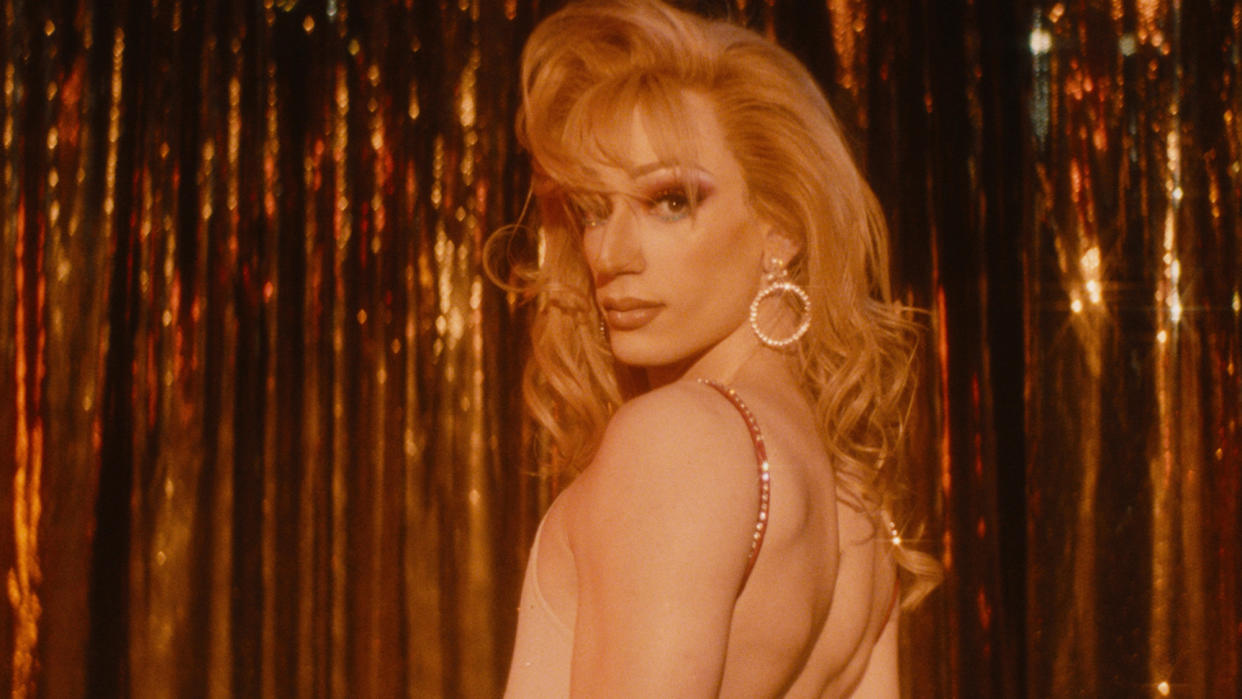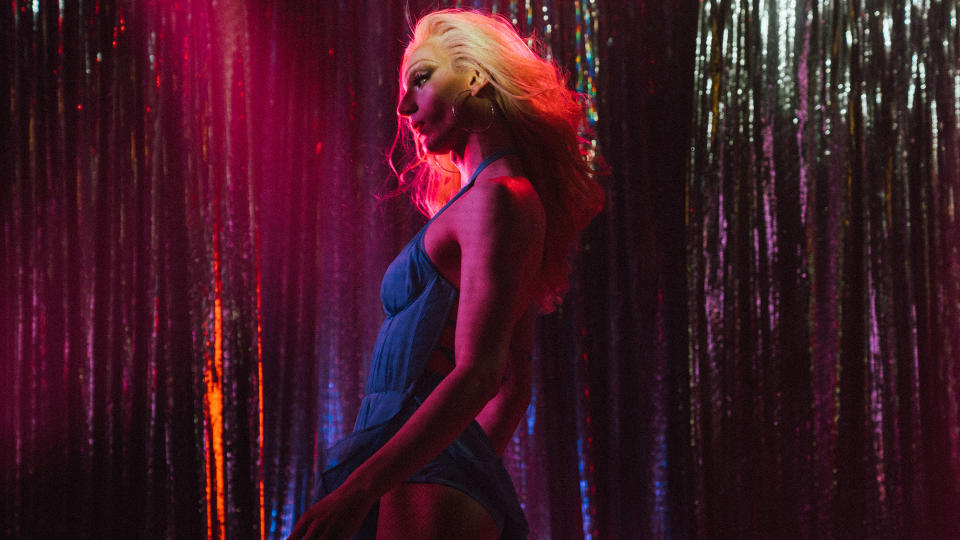Drag, Liberation, and Toxic Love: How ‘Solo’ Dances Into an Unusually Complex Portrayal of Queer Performance

French Canadian director Sophie Dupuis’ third feature, “Solo,” saunters past the usual questions of queer identity and acceptance we often see onscreen.
Instead, her film (May 24, Music Box Films) starring 26-year-old muse Théodore Pellerin (“Beau Is Afraid,” “On Becoming a God in Central Florida“) dances headlong into the suffocating effects of toxic love, via an art form that’s all about liberation: drag.
More from IndieWire
The Toronto Film Festival premiere opens with a gorgeous, sinewy rising star of the Montreal drag scene (Pellerin) twirling across the stage to ABBA’s “Voulez-Vous,” while the screen goes from black to neon shades of purple. As the scene bleeds into a montage of Simon, now out of drag and dancing under the club lights, the world of “Solo” widens to his fellow queens, his sister Maude (Alice Moreault), and a newbie performer who catches his eye, Oliver (Félix Maritaud). And, for a brief moment, it appears that the carefree Simon is destined to have it all: a passionate romance with the recent French arrival, the unconditional support of his friends and family, and the adoration of the city’s drag-going public.
But things sour for Simon at home and at the club, as Oliver exhibits textbook traits of a toxic partner, criticizing and exerting control over his boyfriend’s every move. The shift also happens to overlap with the return of Simon’s long-absent mother (Anne-Marie Cadieux), a famous opera singer who chose stardom over domestic duties and an experienced gaslighter in her own right. As Simon spirals under the pressure of pleasing his boyfriend and his mother, the film draws contrasts between the personas we willingly put on and those we adopt when desperate to be loved.
“One thing I’ve realized recently is I love characters who play,” Pellerin, who starred in both of Dupuis’ previous features, “Family First” (2018) and “Underground” (2020), told Indiewire in a joint interview with the director. “We all have a persona that we play, but I love characters who aren’t even really aware that they’re playing, and there is an aspect of that in Simon.”
Pellerin, perhaps best known to stateside audiences for his role in Eliza Hittman’s coming-of-age abortion drama “Never Rarely Sometimes Always,” added, “[Simon] is becoming a version of himself that can be loved by his mom and by Oliver. There’s a constant reorientation of who he is and what he can be or say to be loved by people who don’t love him unconditionally. That’s very much the essence, from what I understand, of toxic relationships: that very, very conditional love, where you model yourself after what this person needs and wants — and the needs and wants are also always changing, so it’s very difficult to grasp.”
Though Dupuis said she wrote the screenplay out of a desire to marry drag and toxic love rather than to channel personal experience, “Solo” captures the hollowing effect of reinventing yourself into a hopefully more pleasing version.
On stage, Simon gradually loses his bubblegum-hued luster, abandoning glittery gowns and boppy pop songs for Oliver’s grittier performance style — depicted in lip-sync numbers that vacillate between cinematically heightened and documentary-like cinéma vérité. Off stage, he shrinks from the outside world, maintaining his composure in public mostly with the aid of booze and pills. And what’s left of Simon snaps by the time his mother turns up at the club to see him perform, causing an onstage meltdown and eventually leading him to question whether there’s love left to try and win back.
“That scene, in particular, was very tough to shoot. It was actually the one scene that we had a big disagreement on, Sophie and I,” Pellerin said of the moment Simon confronts his mother late in the film. “In the edit, [Sophie] made what became one of the best scenes of the film, from my perspective. But it was the only day where we went over time — where we stopped and went in a different room and talked. Everybody was just waiting, and we were, like, ‘No, it’s not this’ and ‘It can’t be that.’

“It’s funny how sometimes you feel lost; you try things and you don’t feel good,” he added. “And after that scene, I felt awful for like a week and a half. I was, like, ‘I’m the worst fucking actor in the world, and I hate myself, and everybody hates me, and Sophie hates me.'”
Their disagreement over how to approach the scene isn’t the first time that Pellerin and Dupuis have shared an intense moment on set.
As part of her unique approach to directing — and what Pellerin describes as her “incredible strength” — Dupuis embraces close collaboration with her actors, spending weeks in rehearsals and significant set time workshopping her scripts and getting feedback. So the two have spent years hashing out complex characters like the actor’s volatile, young gangster in “Family First” and scene-stealing best friend with a brain injury in “Underground.” And their established closeness leads to inevitable disagreements, something the director sees as a healthy part of the creative process.
“The way we’re working together is very special. I want to hear my actors; I want to hear what they think about the story, their characters. I give them this space, and I want them to express themselves,” said Dupuis, who actively reworked her latest script during rehearsals with a broken leg and “a constant smile on her face,” according to Pellerin.
“Sometimes, we get to a point, like this day, where we’re not on the same page. Théodore was feeling very bad about it, but for me, it was a good thing. I wanted us to go through that and to get to that stage in our creativity,” she said. “So, yes, it was hard, but I think it was normal and even good.”

While the two won’t reveal how exactly their visions for the scene differed, beyond “an energy thing,” Dupuis did describe how Pellerin has shaped her films, specifically, by insisting that his characters be grittier and more flawed than they first appear on the page. In the case of “Solo,” which Dupuis started writing while admittedly still naive about some of the darker sides of the queer experience, the messier aspects of the character take a bit longer to reveal themselves. But as Simon’s wide-eyed enthusiasm gives way to insecurity, emptiness, and ultimately grief, a more fully formed version emerges from behind the curtain — thanks, Dupuis said, to the advice of her star.
“It’s the thing that I love about Théodore: He doesn’t want his characters to be too perfect and too good,” Dupuis said of Pellerin bringing humanity to his roles.
“I remember the first read [Théodore] did, [he] said I have to le salir,” which translates to “dirty him,” she said. “And every time he’s telling me that, because it wasn’t the first, he’s giving me lessons on what it is to be a good writer or even a good director.”
“Solo” opens Friday, May 24 in select theaters from Music Box Films.
Best of IndieWire
Every Palme d'Or Winner from the Cannes Film Festival, Ranked
The 13 Best Thrillers Streaming on Netflix in May, from 'Fair Play' to 'Emily the Criminal'
The Best Father and Son Films: 'The Tree of Life,' 'The Lion King,' and More
Sign up for Indiewire's Newsletter. For the latest news, follow us on Facebook, Twitter, and Instagram.

 Yahoo News
Yahoo News 
